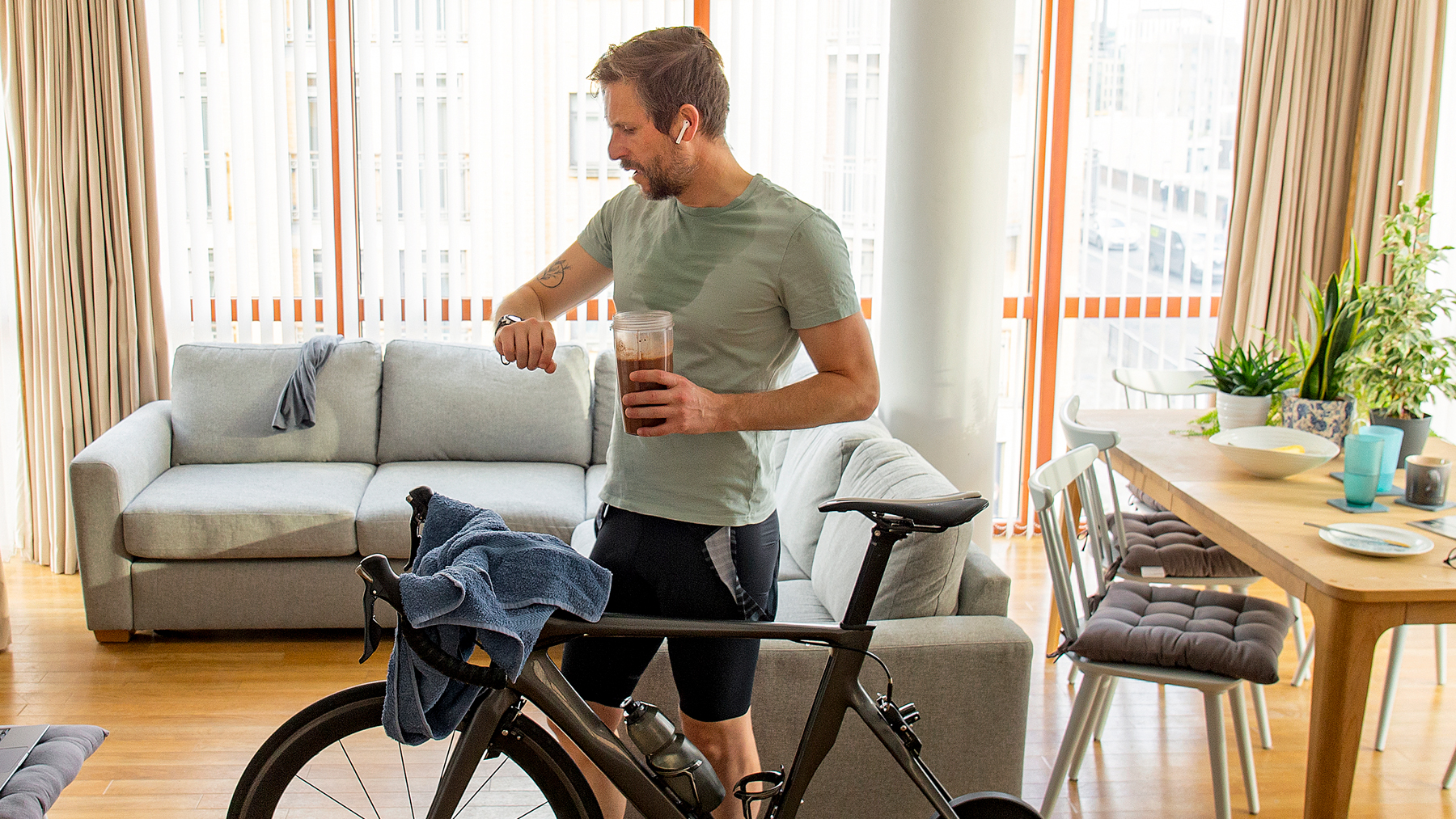When should you take protein powder?
When should you take protein powder, and what are its benefits? We’ve got everything you need to know about protein supplements


Start your week with achievable workout ideas, health tips and wellbeing advice in your inbox.
You are now subscribed
Your newsletter sign-up was successful
When should you take protein powder? Before or after exercise? Whether you’re new to the world of protein supplements or a seasoned protein shake lover, you may not know the right time to take it.
Protein supplements are a popular choice for athletes, fitness enthusiasts and people who want to lose weight. However, depending on what you want to achieve, there is evidence to suggest that it may be worth timing when you consume your protein to get the best results.
We’ve checked the latest research on protein powders and spoken to the experts. We’ll let you know the optimum times to take a protein shake if you’re maximizing muscle development, trying to lose weight or just want to improve your overall nutrition.
So whether you’re looking to bulk up or you already take the best protein powder for weight loss, we’ve got the lowdown on timing your intake.
What are the benefits of using protein powder?
Protein is an essential nutrient that the body needs to function correctly and has extra benefits to assist with weight and fitness goals. Here are just a few benefits of using protein powders:
Muscle growth and development
Protein supplements can significantly enhance muscle strength and size when combined with resistance exercise training, according to a 2018 systematic review. In addition, a protein shake after strength training can also help muscles and tissues repair themselves, stimulating further muscle growth.
Weight loss and appetite control
A high protein diet can help to increase metabolism and reduce feelings of hunger, according to a 2021 article in the Journal of Obesity & Metabolic Syndrome. Getting enough protein if you’re dieting is also essential so as not to lose muscle mass.
Start your week with achievable workout ideas, health tips and wellbeing advice in your inbox.
According to the Journal of Obesity and Metabolic Syndrome, a high protein diet is around 30% of your daily calories or 1-1.2 grams per kilogram of your ideal body weight daily. Using a protein supplement on a day where you haven’t had time to add fresh sources of protein into your meals, may be a quicker and easier way to get the extra protein in the short term, without worrying about cooking up a high-protein lunch or dinner.
Provides extra nutrition
Vegan or vegetarian people might find getting enough protein in their diet challenging. Although there are many plant-based foods with high levels of protein, such as pulses, tofu, soya, nuts and seeds, you may want to have a plant-based protein supplement from time to time to top up your protein levels.
Despite the plant protein vs whey protein debate existing, both vegan and dairy based protein powders can provide adequate nutritional value to your diet.
As we age, we lose muscle tissue. So older people need more protein in their diet to prevent or treat this loss of muscle function and maintain good nutrition - around 1.2g per kilogram of body weight per day is recommended in a Nutrients journal study.
It’s quick and convenient
We talked to Emily Servante, Global Trainer Education Manager and certified personal trainer at Ultimate Performance, for her professional advice on the benefits of protein powders.
“Protein powder is a speedy and convenient way of consuming moderate amounts of protein in one easy hit,” says Servante. “If you work in an office or are busy, it’s hard to rustle up a fillet mignon or a grilled chicken salad in your lunch hour. A scoop or two of protein powder mixed with water or milk means you can give yourself an easy-to-digest, immediate hit of protein.”
“The main reason to consume protein post-workout is to help you recover and stimulate your muscles to grow. Good quality proteins contain amino acids which help repair damaged muscles and make them stronger.”

Emily began lifting weights when she was 25 and, a couple of years later, took her Personal Training qualification. After working in commercial gyms for about two years, Emily took up a role as one of Ultimate Performance’s top-ranked female personal trainers at U.P.’s London City and Kensington gyms, where she worked with scores of clients to help them achieve their body transformation goals.
When should you take protein powder?
The answer to this question depends on your health goals.
If you take protein powder to increase your muscles after resistance training and to help them recover, the International Society of Sports Nutrition suggests that you take it within 2 hours of training. This is your “anabolic window” when your muscles and tissues are most receptive to protein.
Servante agrees. “If you’ve eaten sufficient protein within two hours of starting your exercise session, you should have a decent pool of amino acids – the building blocks that make up protein – in your system.”
If you take protein powder to lose weight, having it in the morning may be more beneficial, as it may help to stave off hunger pangs throughout the day. You may also prefer to replace a meal with a protein shake to speed up weight loss. However, be aware that the Mayo Clinic advises against doing this in the long term, as it can mean that you miss out on the other nutritional benefits of whole foods.
If you’re older and take protein powder to maintain nutrition or prevent muscle loss, it may be better to take a protein supplement of 30g twice daily. This should be soon after some physical activity and ideally with meals or as a between-meal supplement. These were the findings of a 2021 review into the use of protein supplements in the elderly.

How often should you use protein powder?
The recommended daily allowance (RDA) of protein is 0.8g per kilogram of body weight. So if you weigh 200lb, you’ll need around 72g of protein daily.
If you’re weight training, the International Society of Sports Nutrition advises eating up to 3g of protein per kilogram of body weight every day. This helps to optimize muscle growth.
Don’t forget other sources of protein in your diet. Meat, fish, eggs and milk are all great sources of protein. If you already eat a lot of protein in your diet, you may want to cut some of it out if you wish to take a protein supplement. Always ensure you’re getting enough protein to meet your needs, and try not to go overboard.
“How often you should have these shakes is debatable,” says Servante. “One more protein shake per day would be fine if it helps you hit your overall protein intake target for the day. However, how much protein you should consume can depend on lots of factors such as your age, overall health goals and your current weight.”
Is consuming protein powder necessary?
“Consuming adequate amounts of protein is vital for anyone, particularly if you’re following any fitness regime,” says Servante. “However, that does not mean you should substitute all your meals for protein shakes. Single source, good-quality foods such as lean cuts of meat, eggs and fish are far better options than protein shakes.”
Servante also has a word of warning on protein powders. “Some of the best protein shakes will have some sugar or sweetener mixed in. Single source foods will always be better for you, and the quality of nutrients is better. So, a protein powder shake after a tough session is great, but stick to real foods for the rest of your day!”
Got more questions surrounding taking protein? For example, what are the different types of protein? We can answer this and suggest some top high protein breakfast ideas for you while you are here.
Joanne Lewsley is a freelance health and lifestyle writer who specializes in evidence-based content. She is a regular contributor to Live Science, Medical News Today, and Fit&Well.
Joanne has worked for some of the web’s biggest brands, including BabyCentre UK, BBC and Lastminute.com. She has also worked with ITV, Sky and Channel 5 in launching flagship TV websites to support broadcaster content.
Previously UK editor at parenting site BabyCentre UK, Joanne led a team of editors and freelance writers to create award-winning health content.
Moving to freelance has allowed Joanne to explore and develop her passion and expertise in creating health, wellness and lifestyle content that is clear, easy to read and based on solid evidence.
She also regularly reviews health and wellness gadgets and tech for a fleet of websites, including Top Ten Reviews and LiveScience.
As well as creating long-form content, Joanne has a keen news sub-editor’s eye, creating compelling news headlines and packages for breaking news on the AOL and Yahoo websites.
In her spare time, she loves visiting the Norfolk Broads close to her home in Norwich, trying to break the 5k barrier on her running, and indulging in her love of live music.
